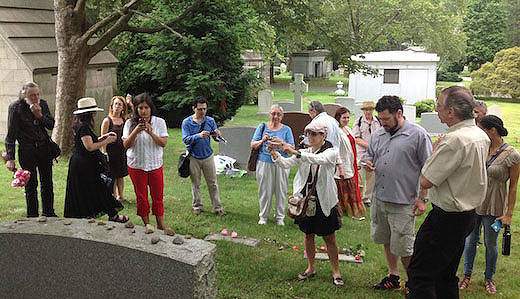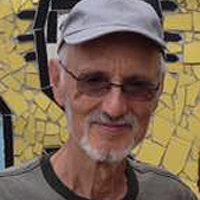
BRONX, N.Y. – Recently I had the opportunity to spend an afternoon in Woodlawn Cemetery (a beautiful 400 acre expanse) here, learning more about a giant in New York progressive movement, Vito Anthony Marcantonio. The group honoring him was comprised of poets, authors, students and historians familiar with Marcantonio‘s legacy.
Marcantonio was a congressman for New York City’s East Harlem district for 14 years; he was born Dec. 10, 1902 and died in Aug. 9, 1954.
Vito Marcantonio has been virtually erased from the history books. This successful attempt to remove him from the study of the progressive movement of the 1930s and 40s has dealt a severe blow to the movement. It has deprived generations of the rich history of his life, his devotion to the working class, and the great achievements made during that period with others such as Ben Davis – in the NY City Council along with Peter Cacchione.
Gerald Meyer, a history professor at Hostos Community College for over 30 years, and poet Gil Fagiani-both founders of Vito Marcantonio Forum-organized the event. Marcantonio, the son of an Italian immigrant mother and first-generation American father, was born in East Harlem. His political life was, from the very beginning, closely associated with that of his friend and early mentor Fiorello LaGuardia, who was the most progressive mayor of NYC.
Despite growing up poor, he eventually managed to enter New York University Law School. While at university, Marcantonio became involved in politics. He served as assistant United States district attorney from 1930-31. In 1933, he played an important role in the successful election campaign of La Guardia. Marcantonio was elected to Congress in 1934, where he represented New York’s 20th district.
As a congressman, he stood up for freedom of speech by opposing the policy of deporting left-wing people for their political views, saying, “I do not believe in the deportation of any man or woman because of the political principles that they hold. Irrespective of what a person advocates, he or she should not be molested, because our Government has been based upon the principles of freedom of speech, freedom of the press, freedom of religion and freedom of thought.”
Marcantonio was defeated in 1936, but won the seat back in 1938 as the American Labor Party candidate. A strong supporter of President Franklin Delano Roosevelt and the New Deal, Marcantonio held the seat for the next 12 years. In Congress he argued that the “unemployed are victims of an unjust economic and social system which has failed.” Marcantonio was also a strong supporter of African American civil rights, according to the British Spartacus Educational website.
As Meyer, author of “Vito Marcantonio: Radical Politician, 1902-1954” (now in its fourth printing), has pointed out: “In the House, Marcantonio distinguished himself as the major leader for civil rights legislation by sponsoring anti-lynching and anti-poll tax bills as well as the annual fight for the Fair Employment Practices Commission’s appropriation. He served as de facto congressperson for Puerto Rico, insuring that it was not excluded from appropriations bills. He also submitted five bills calling for the independence of Puerto Rico.”
In his moving talk at Marcantonio’s grave, Meyer reminded the gathering, “In the entire history of the U.S. Congress, Vito Marcantonio was probably the most ardent, consistent, and eloquent advocate for the immigrants. Marc also served as the vice president of the American Committee for the Foreign Born, which effectively fought for the rights of immigrants, protected them from deportation, and help educate the American public about the great contributions of immigrants to American society.”
In 1950, Marcantonio was defeated. He and others believed that his defeat was the result of the enactment of the Wilson Pakula Act, which disallowed anyone who was not of the two major parties to run in those primaries. Marcantonio was registered with the American Labor Party at the time.
His defense of workers’ rights, his mastery of parliamentary procedure and his ability to relate to the workers in his district while engaging in worldwide issues, endeared him to many on the left.
At his funeral, after his sudden death of a heart attack at the age of 52, hundreds of thousands of people placed flowers on the sides of the path of the coffin to pay their last respects; because of his left wing ideology, the Catholic Church denied him funeral services.
“His legacy, I think you will agree, has never been more relevant than it is today. His speeches and positions on immigration, labor, war, education and civil rights continue to be clear messages worth revisiting,” said poet Fagiani.
Photo: PW/Gabe Falsetta












Comments